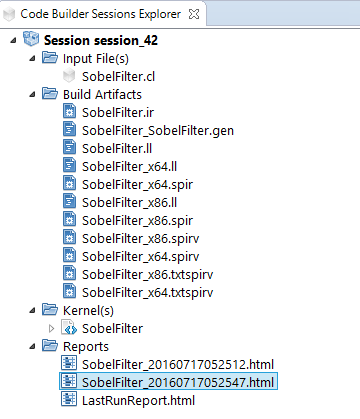Developer Guide for Intel® SDK for OpenCL™ Applications 2017
ID
773042
Date
10/22/2018
Public
A newer version of this document is available. Customers should click here to go to the newest version.
Legal Information
Getting Help and Support
Introducing the Intel® SDK for OpenCL™ Applications
What's New in This Release
Which Version of the Intel® SDK for OpenCL™ Applications Should I Use?
Intel® Code Builder for OpenCL™ API Plug-in for Microsoft Visual Studio*
Intel® Code Builder for OpenCL™ API Plug-in for Eclipse*
Debugging OpenCL™ Kernels on GPU
Intel® SDK for OpenCL™ Applications Standalone Version
OpenCL™ 2.1 Development Environment
Intel® FPGA Emulation Platform for OpenCL™ Getting Started Guide
Troubleshooting Intel® SDK for OpenCL™ Applications Issues
Configuring Microsoft Visual Studio* IDE
Converting an Existing Project into an OpenCL™ Project
OpenCL™ New Project Wizard
Building an OpenCL™ Project
Using OpenCL™ Build Properties
Selecting a Target OpenCL™ Device
Generating and Viewing Assembly Code
Generating and Viewing LLVM Code
Generating Intermediate Program Binaries with Intel® Code Builder for OpenCL™ API Plug-in
Configuring OpenCL™ Build Options
Build Artifacts
Once OpenCL™ program build is completed, the build artifacts appear under the Builds Artifacts note in the Code Builder Session Explorer. The list of artifacts includes:
- Generated LLVM code (<file_name>.ll)
- Generated assembly code for CPU only (<file_name>.asm)
- Generated Intel Graphics disassembly code for each kernel (<file_name>_<kernel_name>.gen)
- Program's intermediate program's binary (<file_name>.ir)
- 32-bit version of generate SPIR LLVM code (<file_name>_x86.ll)
- 64-bit version of generate SPIR LLVM code (<file_name>_x64.ll)
- 32-bit version of the SPIR binary (<file_name>_x86.spir)
- 64-bit version of the SPIR binary (<file_name>_x64.spir)
- 32-bit version of generate SPIR-V code (<file_name>_x86.txtspirv)
- 64-bit version of generate SPIR-V code (<file_name>_x64.txtspirv)
- 32-bit version of the SPIR-V binary (<file_name>_x86.spirv)
- 64-bit version of the SPIR-V binary (<file_name>_x64.spirv)

All build artifacts are stored in the session folder. You can double-click the LLVM/Assembly code to see its content in the IDE editor. You can open the containing folder by right-clicking one of the files and selecting Open Containing Folder.